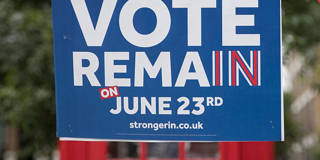Academics and policymakers may be tempted to respond to events like Brexit by dismissing what looks like a celebration of ignorance and retreating into ivory towers. What they really need to do is stop lecturing, be more humble, and stop looking only at the aggregate effects of policy decisions.
PARIS – By the time British citizens went to the polls on June 23 to decide on their country’s continued membership in the European Union, there had been no shortage of advice in favor of remaining. Foreign leaders and moral authorities had voiced unambiguous concern about the consequences of an exit, and economists had overwhelmingly warned that leaving the EU would entail significant economic costs.

PARIS – By the time British citizens went to the polls on June 23 to decide on their country’s continued membership in the European Union, there had been no shortage of advice in favor of remaining. Foreign leaders and moral authorities had voiced unambiguous concern about the consequences of an exit, and economists had overwhelmingly warned that leaving the EU would entail significant economic costs.